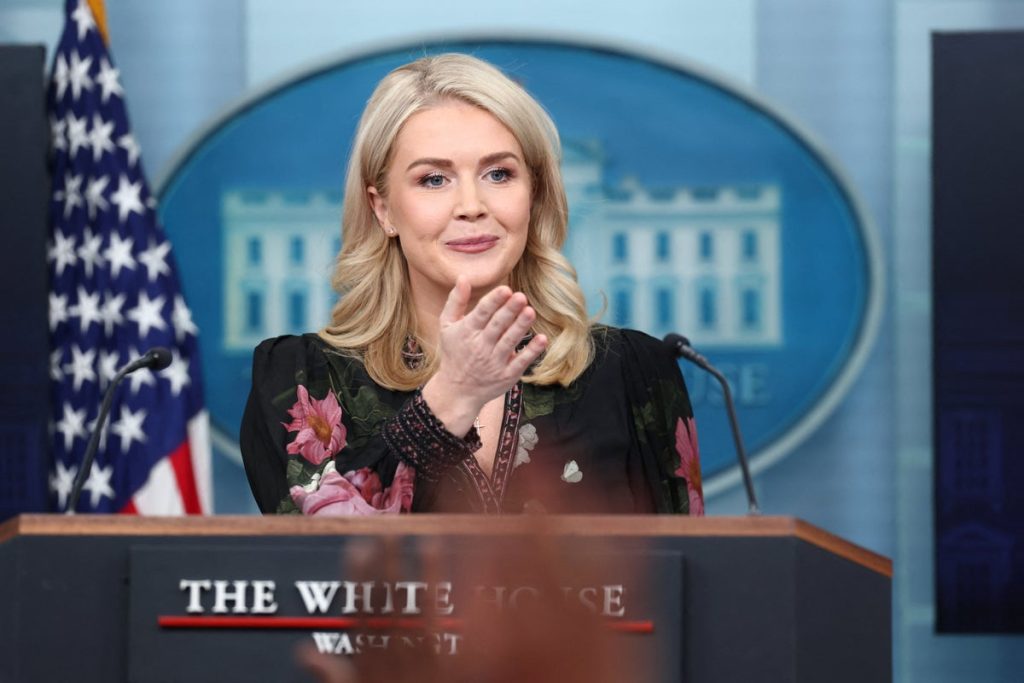Listen to the article
Donald Trump’s press secretary launched a scathing attack on the BBC Wednesday, labeling the British public broadcaster a “leftist propaganda machine” following an interview with the former president.
Karoline Leavitt, Trump’s campaign press secretary, issued the rebuke after BBC interviewer Gary O’Donoghue questioned the Republican nominee about his controversial comments relating to political violence and election denialism.
“The BBC is a taxpayer-funded leftist propaganda machine,” Leavitt wrote on social media platform X. “Their correspondent’s questions were loaded with falsehoods and bias.”
The confrontation began when O’Donoghue, the BBC’s North America correspondent, pressed Trump about his rhetoric during a campaign stop in Michigan. The reporter specifically referenced Trump’s previous statements suggesting there would be a “bloodbath” if he lost the election and his continued claims that the 2020 election was “stolen.”
Trump appeared visibly irritated during the exchange, cutting off O’Donoghue multiple times and dismissing his questions as “nasty” before campaign staff intervened to end the interview.
Media experts note that this latest attack fits into a broader pattern of the Trump campaign’s contentious relationship with news organizations. Throughout his political career, Trump has regularly criticized outlets he perceives as unfavorable, frequently using terms like “fake news” and “enemy of the people” to describe mainstream media.
The BBC, founded in 1922, operates under a Royal Charter and is primarily funded through a license fee paid by British households. While it maintains editorial independence from the British government, the broadcaster has faced criticism from across the political spectrum in the UK, with conservatives often claiming it has a liberal bias and progressives sometimes accusing it of establishment leanings.
In the United States, the BBC is generally regarded as a relatively neutral international news source, though perceptions vary widely depending on political affiliation. Media bias tracking organizations typically rate BBC News as center or slightly left-of-center in its reporting.
Former BBC journalist Emily Richardson, now a media analyst at Georgetown University, said the attack reflects a growing global trend of politicians attempting to delegitimize independent media.
“What’s particularly concerning is the targeting of public broadcasters, which traditionally operate with mandates for impartiality,” Richardson said. “These institutions are increasingly caught in political crossfire, especially during contentious election cycles.”
The Trump campaign has increasingly restricted media access in recent months, often limiting interviews to friendly outlets and carefully screening journalists at events. Several news organizations have reported difficulties securing credentials for Trump rallies, with campaign officials citing space limitations and security concerns.
The BBC controversy comes as both presidential campaigns intensify their media strategies heading into the final weeks before the November election. The Harris campaign has taken a different approach, increasing the candidate’s availability for interviews across various media outlets, including those perceived as less favorable.
Media watchdog organizations have expressed concern about the potential long-term impact of such confrontational approaches to the press. The Committee to Protect Journalists recently issued a report warning that hostility toward media from political leaders often correlates with declining press freedom and increased threats against journalists.
Neither the BBC nor O’Donoghue have publicly responded to Leavitt’s characterization of the network as a “propaganda machine.” The British broadcaster has generally maintained its policy of not engaging in political disputes about its coverage, instead directing critics to its editorial guidelines and complaint procedures.
As the election approaches, political analysts suggest the incident highlights the increasingly fraught relationship between political campaigns and traditional media outlets, a tension likely to persist regardless of the election outcome.
Fact Checker
Verify the accuracy of this article using The Disinformation Commission analysis and real-time sources.




19 Comments
If AISC keeps dropping, this becomes investable for me.
Good point. Watching costs and grades closely.
Good point. Watching costs and grades closely.
Uranium names keep pushing higher—supply still tight into 2026.
Good point. Watching costs and grades closely.
Uranium names keep pushing higher—supply still tight into 2026.
Good point. Watching costs and grades closely.
Good point. Watching costs and grades closely.
Interesting update on Trump Press Secretary Labels BBC as ‘Leftist Propaganda Machine’. Curious how the grades will trend next quarter.
Good point. Watching costs and grades closely.
Good point. Watching costs and grades closely.
I like the balance sheet here—less leverage than peers.
If AISC keeps dropping, this becomes investable for me.
Good point. Watching costs and grades closely.
Silver leverage is strong here; beta cuts both ways though.
Good point. Watching costs and grades closely.
Exploration results look promising, but permitting will be the key risk.
Good point. Watching costs and grades closely.
Good point. Watching costs and grades closely.